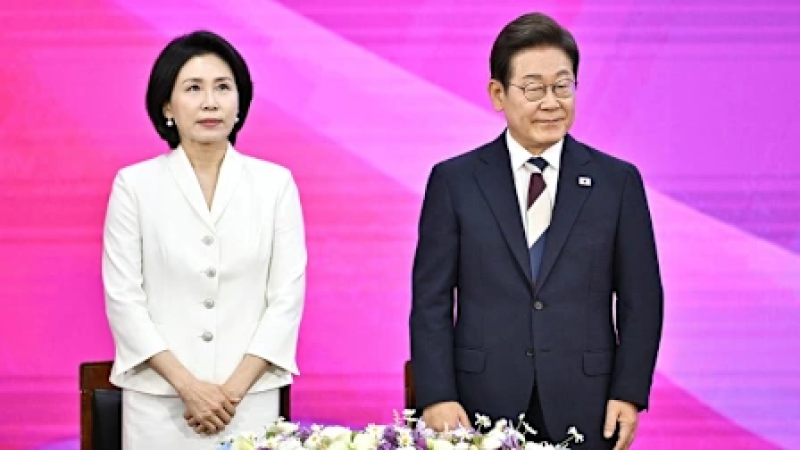- India Sees 9% Drop in Foreign Tourists as Bangladesh Visits Plunge |
- Dhaka Urges Restraint in Pakistan-Afghan War |
- Guterres Urges Action on Safe Migration Pact |
- OpenAI Raises $110B in Amazon-Led Funding |
- Puppet show enchants Children as Boi Mela comes alive on day 2 |
New S. Korean leader vows to rebuild democracy, economy

President Lee Jae-myung and First Lady Kim Hye-kyung arrive for his inauguration at the National Assembly in Seoul on June 4, 2025.
South Korea’s new liberal President Lee Jae-myung vowed on Wednesday to revive democracy from its “near demise” following a recent martial law crisis and to strengthen an economy challenged by rising global protectionism.
Lee’s decisive victory in Tuesday’s snap election signals a major shift for Asia’s fourth-largest economy, after public backlash over a failed military rule attempt led to the early exit of former President Yoon Suk Yeol, just three years into his term.
Facing some of the toughest challenges for a South Korean leader in decades, Lee aims to heal a deeply divided nation scarred by the martial law episode, while navigating uncertain trade tensions with the United States, South Korea’s key economic and security partner.
“A Lee Jae-myung government will be pragmatic and pro-market,” he declared after taking the presidential oath at parliament—the same venue he entered six months ago by scaling a wall to evade martial law troops trying to block a key vote.
He pledged to deregulate to foster innovation and business growth and promised to reopen dialogue with North Korea, all while maintaining a strong US alliance and pursuing balanced diplomacy.
“It is better to win without fighting than to win in a fight, and peace with no need to fight is the best security,” Lee said, referring to the historically fraught ties with North Korea.
Officially confirmed by the National Election Commission, Lee immediately assumed the presidency and commander-in-chief role, receiving a briefing on defence readiness from the top military leader.
With nearly 35 million votes counted, Lee secured 49.42% against conservative rival Kim Moon-soo’s 41.15%, in an election marked by the highest turnout since 1997.
On his first day in office, Lee committed to addressing urgent economic issues, focusing on the cost-of-living pressures facing middle- and low-income families, as well as small business hardships.
He also faces pressure to negotiate with the United States on import tariffs blamed for a major trade imbalance, a deadline the White House is closely monitoring.
The stock market responded positively, with the KOSPI index rising more than 2% to a 10-month high, buoyed by financial sector gains amid expectations of market reforms. Renewable energy stocks also climbed as Lee promised a shift toward greener energy sources.
Urgent Trade Talks with the US
Under the caretaker government, little progress was made in easing US tariffs on key South Korean industries such as autos and steel.
“President Lee has little time to spare before the critical task of reaching a deal with the US administration,” said the Washington-based Center for Strategic and International Studies.
US Secretary of State Marco Rubio congratulated Lee, affirming the “ironclad commitment” between the two nations grounded in shared values and economic ties. He also highlighted ongoing efforts to modernise the alliance to meet current strategic and economic challenges.
The White House described Lee’s election as “free and fair,” while expressing continued concern over Chinese interference in democracies worldwide.
Lee has indicated a more conciliatory approach toward China and North Korea, acknowledging China’s vital role as a major trade partner. However, he has been cautious in addressing security tensions in the Taiwan Strait.
He affirmed continuation of engagement with Japan and emphasized the US alliance as the cornerstone of South Korea’s global diplomacy.

